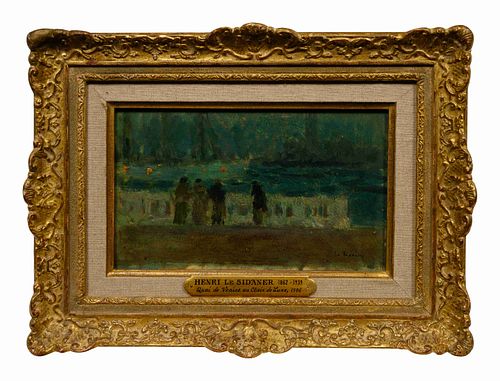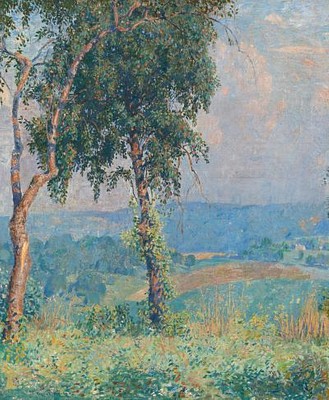Henri Le Sidaner(French, 1862-1939)Le Quai au clair de lune, Venise, c. 1906
Lot 82
About Seller
Hindman
1338 West Lake Street
Chicago, IL 60607
United States
Recognized as the Midwest's leading fine art auctioneers, Hindman Auctioneers has built a worldwide reputation based on a full service approach to the auction business tailored to meet the individual needs of our clients. Coming from a variety of educational backgrounds, specialists bring years of e...Read more
Estimate:
$8,000 - $12,000
Absentee vs Live bid
Two ways to bid:
- Leave a max absentee bid and the platform will bid on your behalf up to your maximum bid during the live auction.
- Bid live during the auction and your bids will be submitted real-time to the auctioneer.
Bid Increments
| Price | Bid Increment |
|---|---|
| $0 | $25 |
| $500 | $50 |
| $1,000 | $100 |
| $2,000 | $250 |
| $5,000 | $500 |
| $10,000 | $1,000 |
| $20,000 | $2,500 |
| $50,000 | $5,000 |
| $100,000 | $10,000 |
About Auction
By Hindman
May 3, 2021
Set Reminder
2021-05-03 11:00:00
2021-05-03 11:00:00
America/New_York
Bidsquare
Bidsquare : American & European Art
https://www.bidsquare.com/auctions/hindman-auctions/american-european-art-6794
Hindman Bidsquare@hindmanauctions.com
Hindman Bidsquare@hindmanauctions.com
- Lot Description
Henri Le Sidaner
(French, 1862-1939)
Le Quai au clair de lune, Venise, c. 1906
oil on panel
signed Le Sidaner (lower right); titled and dated (verso)
5 ½ x 8 ¾ inches.
Provenance:
Galleries Maurice Sternberg, Chicago
Acquired directly from the above, April 1973
Exhibited:
Chicago, Galleries Maurice Sternberg, Le Sidaner, 1970, no. 28, illus.
Literature:
Yann Farinaux-Le Sidaner, Le Sidaner: L'Oeuvre Peint et Grave, Paris, 1989, no. 960, p. 324, illus.
Property from the Miriam B. Swanson Trust, Chicago, Illinois
Lot essay:
The twilit gardens and hushed city scenes of Henri Le Sidaner’s artworks conjure a seductive, mysterious world. Throughout his career, Le Sidaner remained chiefly concerned with capturing atmospheric light and favored a subdued use of color, preferring nuanced greys and opals applied with uneven, dappled brushstrokes. Le Sidaner developed his distinctive lexicon during the 1890s, under the influence of Symbolism. On a formal level, he found a suitably harmonious, all-over treatment for his compositions in Impressionism. This dual aspect of his art was touched on by the critic, and his supporter, Camille Mauclair who wrote: "born out of Impressionism, [Le Sidaner] is as much the son of Verlaine than of the snowscenes of Monet" (C. Mauclair, Henri Le Sidaner, Paris, 1928, p. 12).
Born in 1862 in Mauritius, to Breton parents, in 1872 Le Sidaner’s family settled in Dunkirk, France. In 1882 he left for Paris to study at the École des Beaux-Arts under Alexandre Cabanel. However, Le Sidaner shortly after left because of artistic differences. He relocated to the Ètaples artist colony, which had a tradition of en plain air painting established by Charles-François Daubigny and of the local Deauville painter Eugène Boudin, a leading Post-Impressionist. In the late nineteenth-century numerous artists were drawn by the sand dunes, the atmospheric light and the remnants of an older France.
An inveterate traveler, Le Sidaner made his first trip to Venice in 1892 and the city made an everlasting impression on the artist. He visited again in 1906, when Le Quai au clair de lune, Venise, was likely executed. During this trip, Le Sidaner also completed a series of nocturne paintings: Le Grand Canal, Le Palais ducal, Le Palais Rouge and La Sérénade. These paintings were highly acclaimed for their ability to capture atmospheric lighting effects and used dappled brushwork to create a sense of the luminosity of twilight. In the present painting, the delicate blue and gray harmonies of sky, water, and land shimmer and refract, bestowing the scene with a magical, ethereal feeling.For condition inquiries please contact marygracebilby@hindmanauctions.comCondition
- Shipping Info
-
Please refer to https://hindmanauctions.com/shipping-packing
-
- Buyer's Premium



 EUR
EUR CAD
CAD AUD
AUD GBP
GBP MXN
MXN HKD
HKD CNY
CNY MYR
MYR SEK
SEK SGD
SGD CHF
CHF THB
THB













